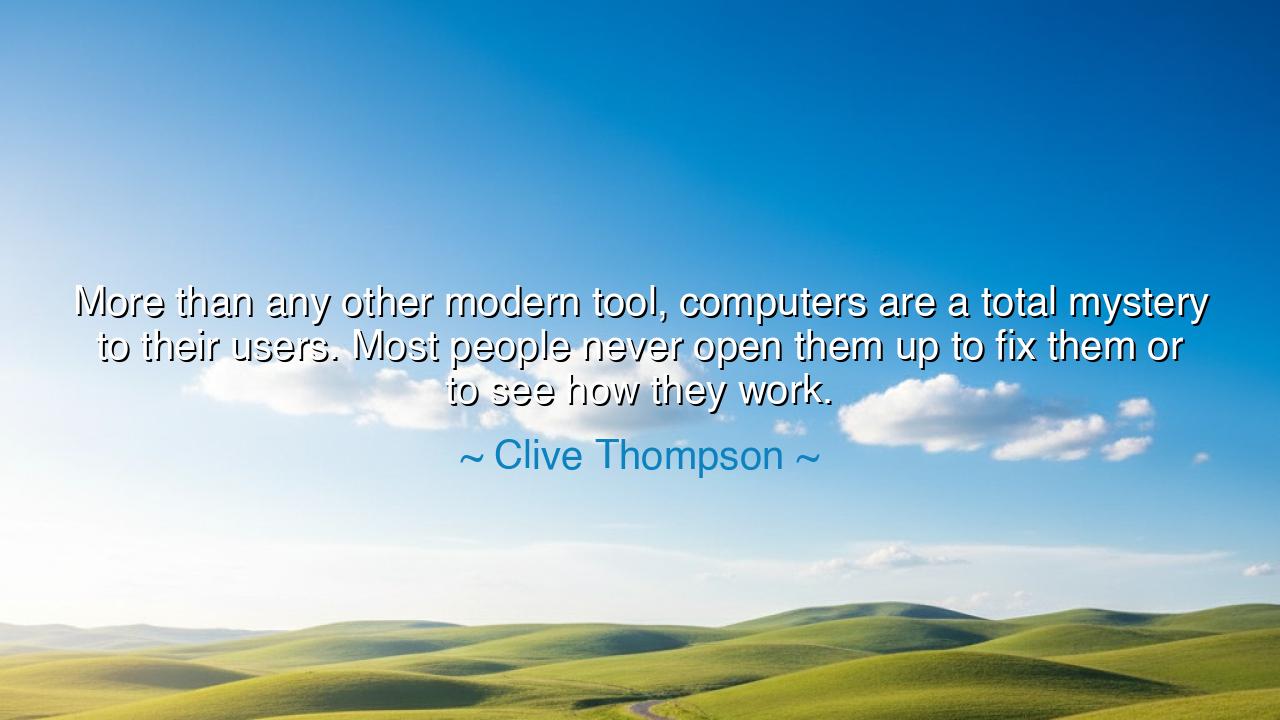
More than any other modern tool, computers are a total mystery to
More than any other modern tool, computers are a total mystery to their users. Most people never open them up to fix them or to see how they work.






When Clive Thompson wrote, “More than any other modern tool, computers are a total mystery to their users. Most people never open them up to fix them or to see how they work,” he was not simply describing technology—he was lamenting a loss of intimacy between human beings and their creations. In these words lies the sorrow and wonder of a civilization that has become surrounded by miracles it no longer understands. Thompson, a chronicler of the digital age, was calling attention to the strange paradox of progress: that the more advanced our tools become, the less connected we are to their inner life. We have built machines of astonishing power, yet we have forgotten the joy of curiosity that once defined human invention.
In ancient times, the craftsman and the tool were one. The blacksmith knew every curve of his hammer, every spark from the forge. The sailor knew the language of the ropes, the wind, and the wood beneath his feet. But in our modern world, the computer—the most transformative tool of all—has become a sealed mystery, glowing and humming with unseen processes. We type, click, and scroll, yet few know what happens beneath the surface. We are users without understanding, magicians casting spells we did not write, trusting in power we cannot explain. It is a condition both wondrous and perilous.
Thompson’s reflection is a warning wrapped in wonder. He asks us to remember that to understand a tool is to possess true power over it, and to lose that understanding is to surrender agency. The ancients taught that knowledge and mastery are sacred virtues—without them, even the finest invention can enslave its master. So too with computers: they have expanded our minds but also dulled our curiosity. We revere them as gods but treat them as black boxes. The danger is not in their existence, but in our passivity before them. When we stop asking how things work, we begin to lose the deeper wisdom of why.
Consider the story of Alan Turing, the father of modern computing. During the Second World War, Turing looked upon machines not as mysteries but as mirrors of thought. He built them, tore them apart, and rebuilt them again. In his eyes, the computer was not a device to be worshiped—it was a partner in discovery, a creation that reflected the logic of the human soul. His understanding unlocked not only the secrets of wartime code but the architecture of modern intelligence itself. His example stands as a testament to Thompson’s warning: only through curiosity, examination, and direct engagement can humanity remain master of its own tools.
Thompson’s quote also speaks to the psychology of convenience that defines the modern era. We have been taught that ease is virtue, that efficiency is progress. Yet convenience, unchecked, breeds ignorance. When a machine breaks, we replace it; when a system confuses us, we trust it blindly. In this way, comfort becomes captivity. The ancients would have seen this as a moral failing—a loss of reverence for craft, for understanding, for the dialogue between human and creation. To live well is to live with awareness, and awareness requires the courage to look beneath the surface, even when what we find is complex or uncomfortable.
There is a quiet heroism in understanding—in opening the machine, in tracing the pathways of cause and effect. Each act of inquiry reawakens the ancient fire of discovery that built our civilization. To open a computer is not just to touch circuits; it is to touch the mind of humanity itself, encoded in silicon and electricity. Thompson’s observation challenges us to return to this sacred engagement—to see the digital world not as a realm of magic, but as a field of wonder waiting to be understood.
In the end, his words are a call to awaken our intellectual curiosity. They remind us that mystery is not meant to be feared, but explored. We must once again become craftsmen in a digital age—students of the tools we wield, not mere consumers of their convenience. For only when we understand the engines of our own creation can we guide them with wisdom, rather than drift under their control.
Final Lesson: Power without understanding is fragility disguised as strength. To be wise in the age of machines, one must dare to open them—to look, to question, to learn.
Practical Actions: Take time to learn how your tools work. Disassemble a device, explore its logic, read the language of code. Cultivate curiosity in yourself and in others. Let no tool, however powerful, remain a mystery to you. For in knowing how your creations function, you rediscover not only control, but the ancient joy of being both creator and student of your own civilization.






AAdministratorAdministrator
Welcome, honored guests. Please leave a comment, we will respond soon